What is OpenVPN Protocol? Best OpenVPN Compatible VPNs in 2025
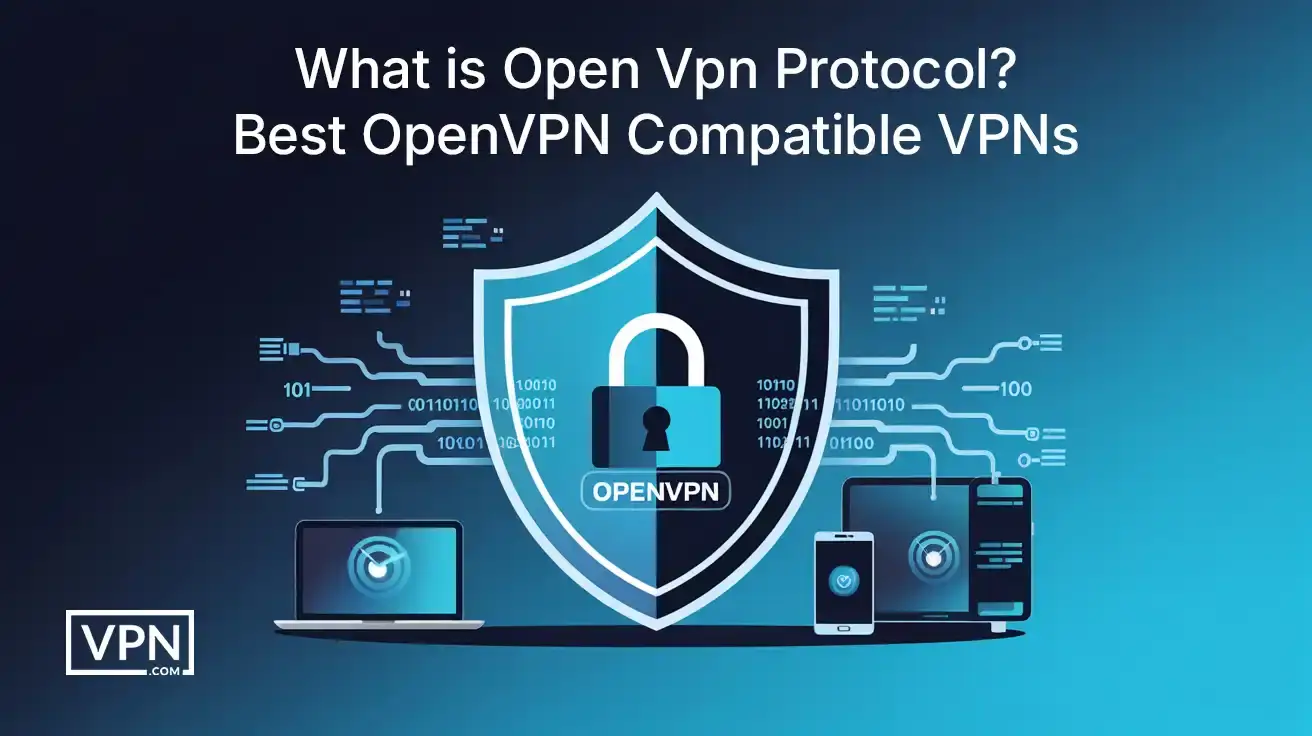
You’re about to make an online payment when a warning pops up: “This network is not secure.” You ignore it. After all, what are the chances of someone actually spying on you?
Pretty high, actually. Hackers can intercept your data in seconds, stealing passwords, banking details, and personal messages without you ever noticing. This is why many people use OpenVPN compatible VPNs. They act as an invisible shield, keeping your internet activity private.
A VPN with OpenVPN encrypts your data, making it unreadable to hackers, trackers, or even your internet provider. With its wide adaptability to almost any device, the OpenVPN protocol is widely trusted for its security and flexibility.
Unlike weaker protocols, VPN for OpenVPN offers strong protection while maintaining reliable speeds. Whether browsing, streaming, or working remotely, this VPN’s best protocol ensures a secure and smooth browsing experience, keeping your data safe.
In this guide, we’ll break down VPN for OpenVPN, its advantages, and the top services using it in 2025.
Key Takeaway Box
OpenVPN is a highly trusted VPN protocol known for its strong encryption, device compatibility, and ability to secure public network usage. It uses encryption, authentication, and tunneling to keep your data private. The article compares UDP vs TCP, highlighting top OpenVPN VPNs like NordVPN, CyberGhost, and ExpressVPN. It’s ideal for privacy, streaming, remote work, and bypassing censorship. Though setup can be complex and speeds may dip, OpenVPN remains a secure, flexible, and reliable choice for users serious about online protection in 2025.
What is OpenVPN Protocol?
Safeguarding your online activities is crucial in the digital era of 2025. One effective way to achieve this is by using OpenVPN-compatible VPNs, which utilize the VPN for OpenVPN protocol to secure your internet connection.
OpenVPN Protocol Definition
The OpenVPN protocol is a highly secure and flexible VPN that protects internet traffic. It creates a secure tunnel between your device and the internet, encrypts your data, and ensures your online activity remains private.
OpenVPN is known for its strength, being open-source, and for its ability to adapt to various networks and devices. This protocol OpenVPN, is among the most trusted in the VPN industry and is often regarded as the best OpenVPN option.
Basic Features of the OpenVPN Protocol
VPN for OpenVPN operates on several key principles to keep your data safe. Here’s a simple breakdown of its core features:
- Encryption: OpenVPN uses robust encryption to scramble your data, making it unreadable to anyone who might try to intercept it.
- Authentication: It verifies that both parties (your device and the VPN server) are who they claim to be, ensuring a secure connection.
- Tunneling: OpenVPN routes your data through a private tunnel, hiding your IP address and preventing third parties from seeing what you’re doing online.

Get Started w/ NordVPN Today
- Top-rated VPN for OS unknown
- Ultra-fast speed in 2025
- Save 69% off with VPN.com Discount
- Plans starting at $2.99/month
- Rated 4.5/5 on Google Play with over 825,000 reviews
- Rated 4.7/5 on Apple App Store from 6,600 users
How Does OpenVPN Protocol Work?
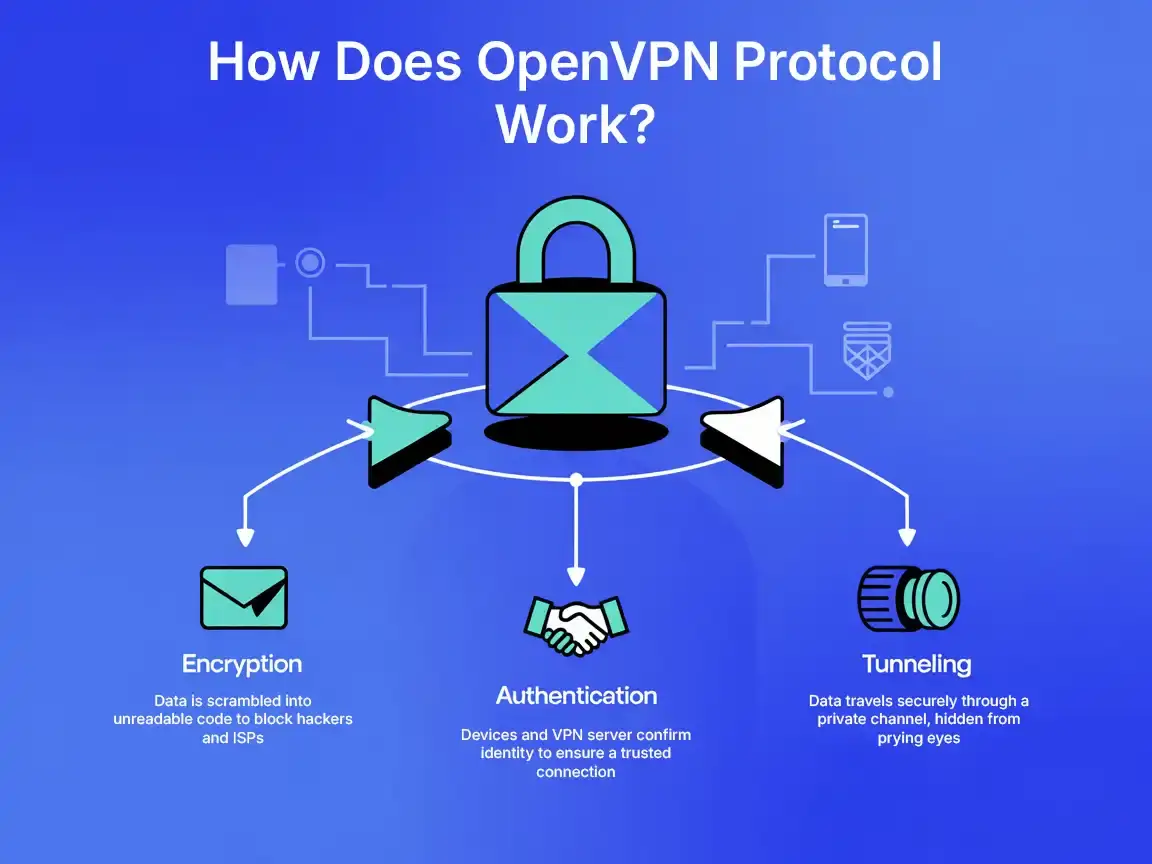
The protocol VPN for OpenVPN secures your internet data through three key steps: encryption, authentication, and tunneling. Here’s how it functions in simple terms.
Encryption – Protecting Your Data
Imagine you’re sending a letter to a friend. Instead of just writing it down, you seal it in an envelope. Encryption works similarly. When you send a request to visit a website, OpenVPN scrambles your data into unreadable code.
This prevents anyone, including hackers or your internet service provider, from seeing your activity.
Authentication – Verifying the Connection
Before your friend can open your letter, you must ensure they are the right person. Authentication in VPN for OpenVPN does this for your device and the VPN server.
Both parties confirm their identity before proceeding, ensuring a secure and trusted connection.
Tunneling – Keeping Your Data Private
Next, the letter is sent through a secret tunnel. In the digital world, this is tunneling. OpenVPN routes your scrambled data through a secure channel to the VPN server.
No one can see your traffic in transit, not even on public Wi-Fi. Once the data reaches the server, it gets decrypted and sent to the website you’re trying to visit.
This process keeps your online activity private. Your data is protected the whole way, and only the VPN server can unlock it. Your connection remains safe whether you’re browsing, streaming, or using a public network. This is the strength of OpenVPN compatible VPNs, which use the best VPN protocol to keep you secure.
VPN for OpenVPN connects to multiple VPN devices and networks, making it a top choice for users looking for privacy in 2025. Whether you need VPN servers for OpenVPN or an OpenVPN alternative, this protocol offers the best protection for your online actions.
When is OpenVPN Used?
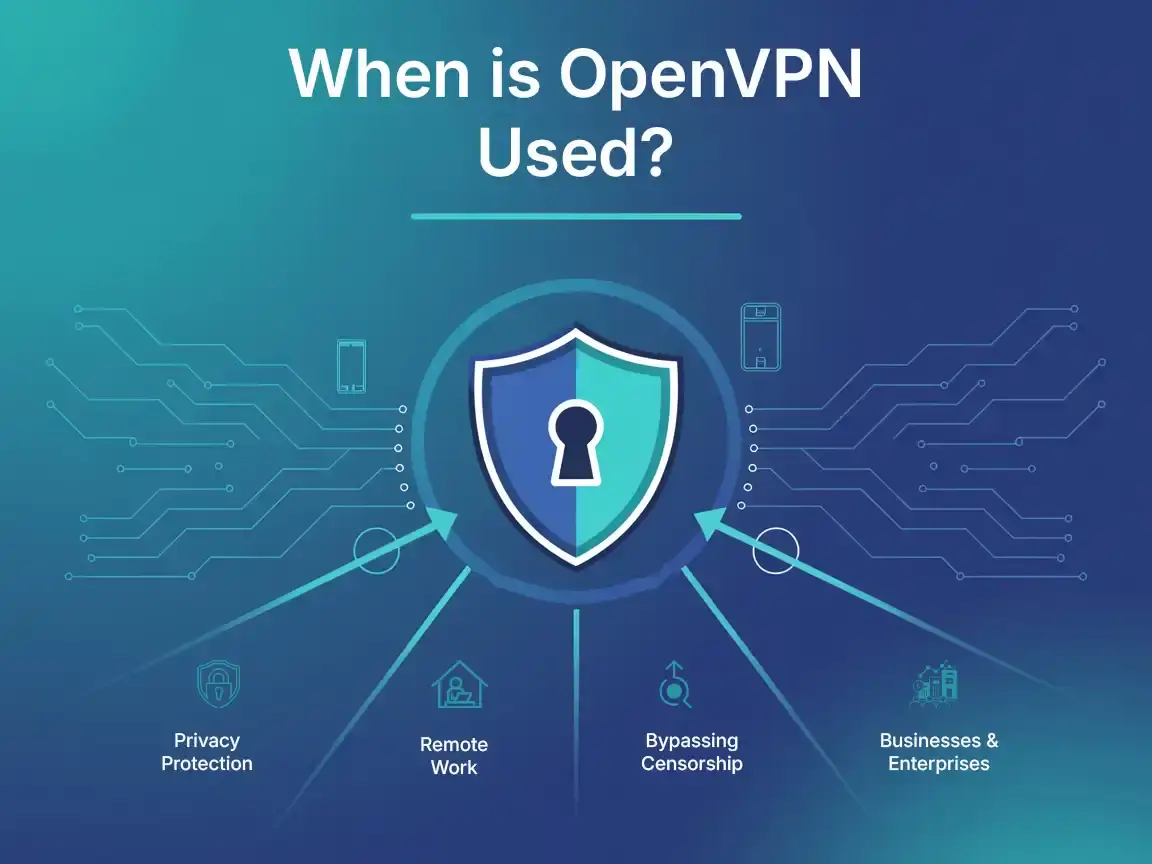
OpenVPN is used in different situations where privacy and security matter. Here are some common reasons people choose it.
Privacy Protection
People use OpenVPN to protect their privacy. It hides their online activity and keeps them safe from hackers and trackers.
When browsing the web, it encrypts their data, making it hard for anyone to see what they’re doing. It works well on public Wi-Fi networks so that no one can spy on their connection.
Remote Work
OpenVPN is helpful for remote work. It securely connects employees to company networks, allowing workers to access important files and apps from anywhere.
This makes it easy for businesses to protect their data, even when people work from home or travel.
Bypassing Censorship
In some places, people can’t access certain websites. OpenVPN helps bypass these blocks. It connects to servers in different countries.
This way, you can access content that might be restricted in your area. If you want a free and open internet, OpenVPN helps you get around censorship.
OpenVPN Compatible VPNs for Businesses and Enterprises
Many businesses use VPN for OpenVPN to protect sensitive data. It provides a secure way for employees to access company information. Businesses can use it for secure file sharing, communication, and cloud access.
Since OpenVPN is free and open-source, it saves companies money on expensive licenses. It also works well for large companies that need to connect multiple offices or remote workers. This is for businesses looking for VPN servers for OpenVPN.
What are OpenVPN UDP and TCP?
VPN for OpenVPN is a widely used VPN protocol that supports two primary transport protocols: UDP (User Datagram Protocol) and TCP (Transmission Control Protocol).
Each has unique characteristics that influence your VPN experience.
UDP (User Datagram Protocol)
UDP emphasizes speed. It transmits data without establishing a connection, leading to faster data transfer.
However, this speed comes with trade-offs, as UDP does not guarantee packet delivery or order, potentially resulting in data loss or out-of-order packets.
If you’re curious how VPNs take advantage of this protocol despite its limitations, here’s a closer look at OpenVPN UDP and how it balances speed with encryption.
TCP (Transmission Control Protocol)
TCP focuses on reliability. It establishes a connection before data transfer, ensuring packets arrive in order and are retransmitted if lost. This process introduces overhead, making TCP slower than UDP.
Still, many users prefer the stability of OpenVPN TCP when security and reliable data transfer matter more than speed.
When to Use UDP vs. TCP
- Use UDP when speed is essential and occasional data loss is acceptable. It’s suitable for activities like streaming or online gaming, where real-time data transmission is crucial.
- Use TCP when data integrity and reliability are paramount. It’s ideal for tasks such as web browsing, email, or file transfers, where accurate data delivery is critical.
Many OpenVPN compatible VPNs default to UDP due to its speed advantages.
However, if you encounter issues like data loss or connection instability, switching to TCP may provide a more reliable experience.
Our Best OpenVPN Compatible VPNs of 2025
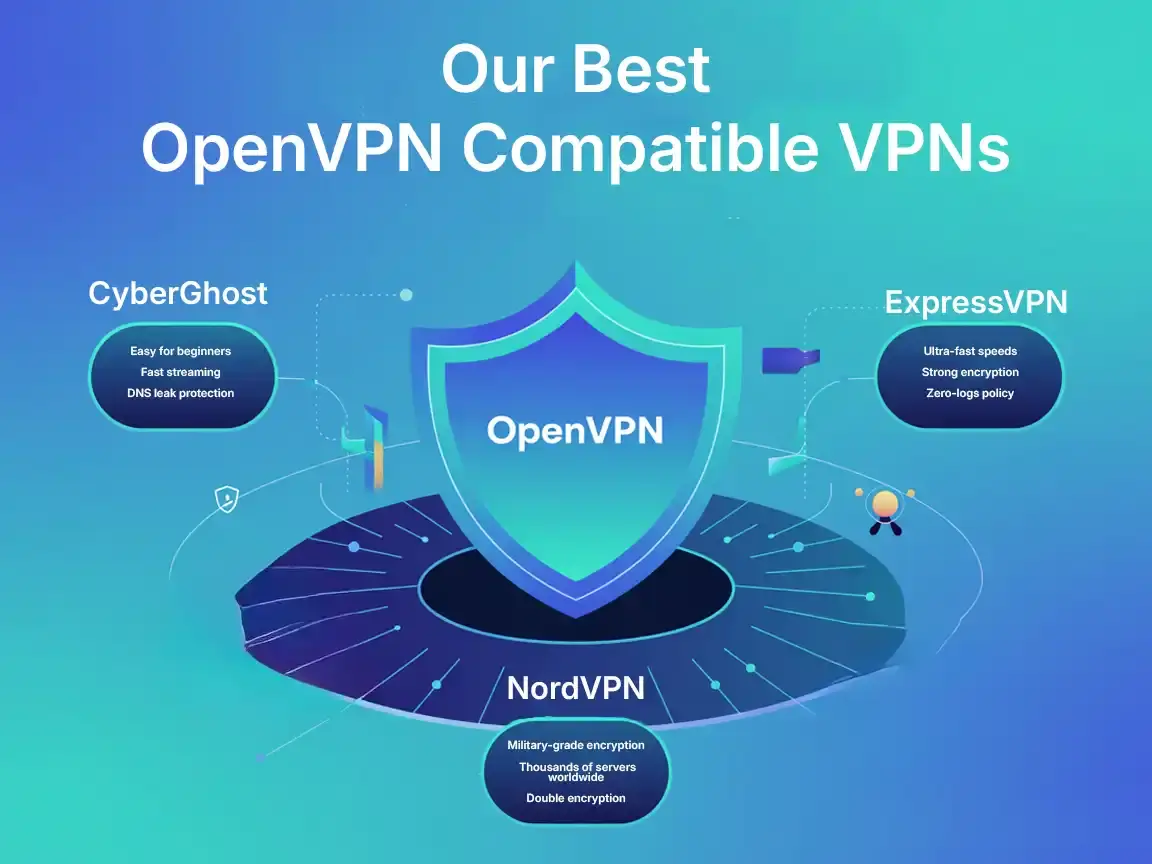
Below are our best OpenVPN Compatible VPNs of 2025.
NordVPN – Best Overall VPN for OpenVPN
NordVPN provides top-tier security with military-grade encryption. It uses the VPN for OpenVPN protocol to keep online activity hidden from prying eyes. It has thousands of servers worldwide, ensuring fast and stable connections.
It has no-logs policy that guarantees privacy, and its double encryption adds more protection. NordVPN is also optimized for streaming, helping users access restricted content effortlessly.
CyberGhost VPN – Best for Beginners and Streaming
CyberGhost VPN makes using OpenVPN VPNs simple. Its user-friendly interface allows quick connections to fast servers in multiple countries. It ensures buffer-free streaming while keeping data safe.
Features like DNS leak prevention and automatic kill switch make it a reliable choice for those who value security and entertainment.
ExpressVPN – Best for Speed and Security
ExpressVPN combines ultra-fast speeds with powerful encryption. It supports Open VPN protocol across multiple platforms, ensuring a secure and seamless browsing experience.
It is one of the most trusted choices for bypassing geo-restrictions and maintaining online privacy. ExpressVPN also features a zero-logs policy, keeping user data completely private.
Why are Our VPNs the Best Choice?
Not all OpenVPN compatible VPNs are equal. Our VPN services stand above the rest with superior security, blazing speeds, and unmatched reliability.
Whether you need a VPN for OpenVPN for privacy, streaming, or cost-effective security, we deliver the best solutions.

Get Started w/ NordVPN Today
- Top-rated VPN for OS unknown
- Ultra-fast speed in 2025
- Save 69% off with VPN.com Discount
- Plans starting at $2.99/month
- Rated 4.5/5 on Google Play with over 825,000 reviews
- Rated 4.7/5 on Apple App Store from 6,600 users
Other OpenVPN Compatible VPNs of 2025
Many VPNs support the OpenVPN protocol, but not all deliver the same quality. Here are other notable options:
Privacy-Focused VPNs
Here are some VPN for OpenVPN privacy focused VPNs.
- AirVPN – Strong Anonymity & No Logs: AirVPN prioritizes privacy and security. It does not keep logs and offers military-grade encryption. Users can pay with cryptocurrency, making it even more secure. The VPN allows port forwarding and custom DNS settings for advanced users.
- Mullvad VPN – True Privacy Without Personal Info: Mullvad VPN does not require personal information to sign up. It allows anonymous payments and has a strict no-logs policy. Its multi-hop servers add another layer of protection, making it one of the best VPNs for privacy.
- ProtonVPN – Secure Core & Extra Privacy: ProtonVPN is based in Switzerland, a country known for strong privacy laws. It routes traffic through Secure Core servers, ensuring data protection. It also supports AES-256 encryption and enforces a zero-logs policy.
Best VPNs for Streaming
Here are some OpenVPN best for streaming.
- Buffered VPN – Fast & Reliable for Streaming: Buffered VPN offers high-speed servers to prevent buffering issues. It quickly unblocks platforms like Netflix, Hulu, and BBC iPlayer, allowing users to enjoy seamless streaming without lag.
- Hide.me VPN Unlocks Geo-Restricted Content: Hide.me VPN uses IP masking to access restricted content. It regularly updates its servers to bypass streaming services’ VPN detection, ensuring uninterrupted entertainment.
- PureVPN – Global Access to Streaming Platforms: PureVPN has over 70 server locations, making it ideal for bypassing regional restrictions. It works well with Amazon Prime Video, Disney+, and other major platforms.
- TunnelBear VPN – Simple and Effective for Streaming: TunnelBear VPN offers fast and stable connections while maintaining strong encryption. Its simple user interface makes it an excellent choice for users new to VPNs.
Budget-Friendly VPNs
Here are some budget-friendly VPN for OpenVPN.
- Private Tunnel VPN – Low Cost, Reliable Security: Private Tunnel VPN was created by the creators of OpenVPN. It is an affordable VPN with basic security features, ideal for users who want simple protection without extra costs.
- Earth VPN – Affordable with Global Access: Earth VPN provides low-cost security while maintaining global accessibility. It’s secure. OpenVPN encryption keeps user data safe at all times.
- Trust.zone – Affordable & No Logs: Trust.zone is easy to use and follows a strict no-logs policy. It ensures encrypted browsing at a budget-friendly price.
- Cactus VPN – Secure and Budget-Friendly: Cactus VPN balances affordability with strong encryption. It includes DNS leak protection and a kill switch, ensuring privacy without breaking the bank.
Advanced VPNs for Tech Users
Here are some advanced VPN for OpenVPN for tech users.
- AstrillVPN – High-Tech Features for Experts: Astrill VPN offers custom encryption settings and stealth technology to bypass restrictions. It also supports multi-hop connections for enhanced privacy.
- Azire VPN – Full Control Over Encryption: Azire VPN allows users to configure WireGuard and OpenVPN protocols and provides dedicated IP options for extra security.
- VersaVPN – Flexible Security Settings: VersaVPN enables customizable encryption methods and split tunneling. It is perfect for users who want complete control over their VPN experience.
- VPNReactor – Port Forwarding for Enhanced Security: VPNReactor supports advanced port forwarding options, allowing users to optimize security and speed. It also uses the OpenVPN protocol with strong encryption.
Choosing the right VPN depends on security, streaming, and budget needs. Our VPNs lead the market with top security, ultra-fast connections, and complete privacy protection.
Our services stand unmatched for users who want the best OpenVPN compatible VPNs.
OpenVPN vs. Other VPN Protocols
You’ll likely encounter different VPN protocols when looking for ways to secure your internet connection. Each protocol is designed to provide secure and private Internet browsing in other ways.
Choosing the proper protocol depends on your needs whether you prioritize speed, security, or compatibility.
What is the Difference Between a VPN and OpenVPN?
A VPN (virtual private network) is a service that creates a secure connection between your device and the internet. It acts as a tunnel that encrypts your data, protecting it from prying eyes. This allows you to browse securely, especially when using public networks.
The OpenVPN protocol is one of the most widely used VPN protocols. It’s known for its open-source nature, allowing regular updates and improvements. Many OpenVPN-compatible VPNs use this protocol because it offers high security and flexibility.
Unlike some protocols, OpenVPN supports strong encryption and is highly customizable, so it remains a popular choice for those who want a balance between privacy and performance.
Is OpenVPN Better than Other VPN Protocols?
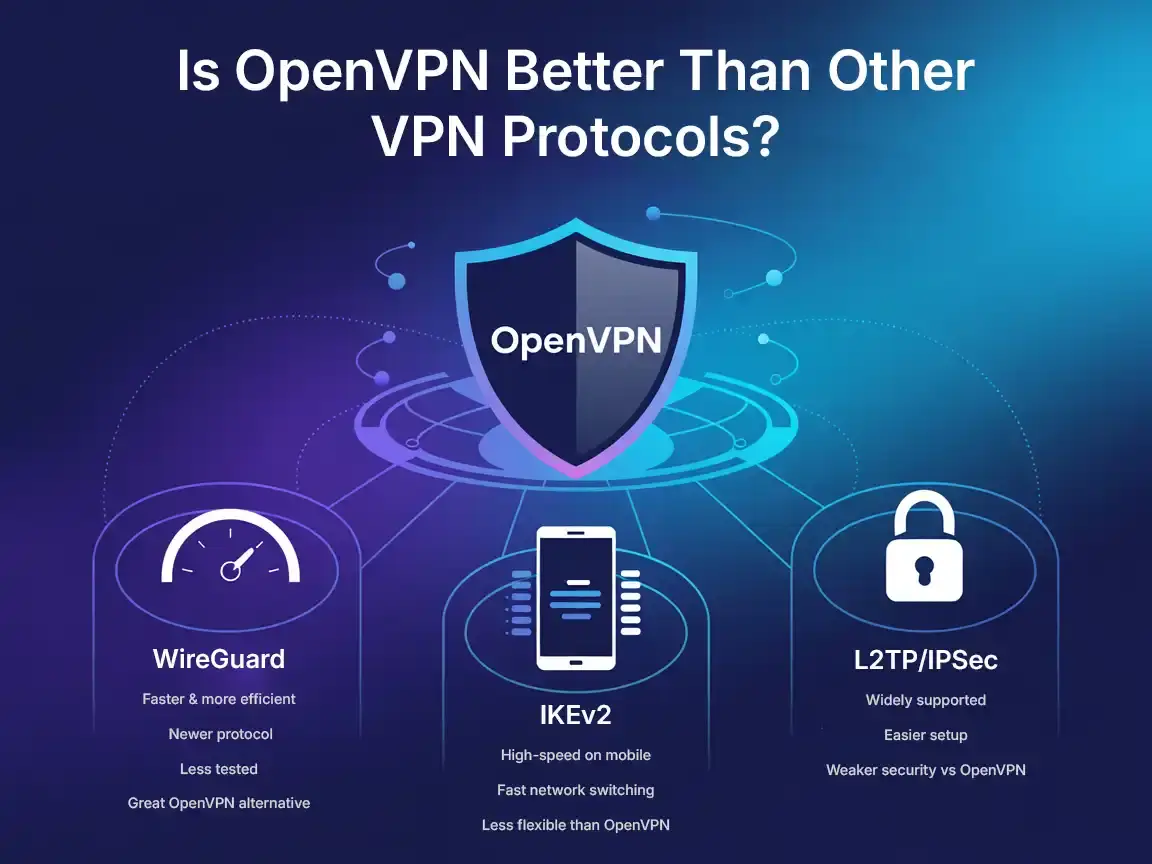
Let’s compare OpenVPN with other popular VPN protocols. This will help you understand which one best suits your needs.
OpenVPN Compatible VPNs vs. WireGuard
VPN for OpenVPN is known for its stability and security. It’s been around for a while, and many people trust it for its reliability. WireGuard, on the other hand, is a newer VPN protocol. It’s faster and more efficient but not as widely tested since it’s new.
WireGuard uses modern cryptography and is excellent for speed, but OpenVPN still holds the edge for flexibility and security. If you need a VPN for OpenVPN, you might get slower speeds but have a well-tested, highly secure option.
Overall, WireGuard is a great OpenVPN alternative if you want something faster, but OpenVPN is still the king for reliable security.
OpenVPN Compatible VPNs vs. IKEv2
IKEv2 is a high-speed VPN protocol, especially for mobile users. It excels at quickly switching between networks, such as Wi-Fi and mobile data. OpenVPN, however, is more flexible and works well across all devices and platforms.
It’s a bit slower than IKEv2 sometimes, but more versatile. IKEv2 is often recommended for mobile devices, while OpenVPN is better suited for desktops and more secure connections.
OpenVPN Compatible VPNs vs. L2TP/IPSec
L2TP/IPSec is an older, best VPN protocol that is still commonly used. It provides good privacy, but it’s not as advanced as a VPN for OpenVPN.
While L2TP/IPSec is easier to set up and supported on many devices, it doesn’t offer the same level of security as OpenVPN. OpenVPN is more secure and supports stronger encryption, making it a better choice for anyone serious about online privacy.
Is OpenVPN Free?
OpenVPN has both free and paid options. The free version offers basic features, which are enough for personal use.
However, it might not include all security features or support. Paid options usually have better security, faster speeds, and better customer support.
Many OpenVPN compatible VPNs offer these paid plans to users. If you need better performance or more features, a paid version might be worth considering.
Should You Choose OpenVPN Compatible VPNs?
VPN for OpenVPN is great for people who prioritize security. It’s reliable and flexible. It works on many devices. If you want the best security, the OpenVPN protocol is a solid choice.
However, if speed or ease of setup is more important to you, other options may exist. Some users may find it complex to set up on specific devices. OpenVPN is suitable for those who want control and customization.
If you’re looking for a VPN for OpenVPN, it’s a great option. Decide based on your needs.
Security and Privacy of OpenVPN
OpenVPN is known for its strong security features. However, like all software, it has areas that need attention.
Is OpenVPN Safe?
OpenVPN has a solid reputation for security. It’s widely used and trusted. Yet, it’s not immune to vulnerabilities.
For instance, in March 2024, several vulnerabilities were discovered that could lead to remote code execution and local privilege escalation if exploited together.
Always use the latest version to maintain safety and promptly apply security patches.
How Secure is OpenVPN?
OpenVPN employs robust encryption standards. It typically uses AES-256 encryption, which is known for its strength.
The protocol uses OpenSSL for secure connections and TLS for key exchanges, ensuring a high level of security. Regular updates and audits help address potential vulnerabilities.
However, it’s crucial to stay vigilant, as new vulnerabilities can emerge.
OpenVPN Private Tunnel
A private tunnel in VPN for OpenVPN creates a secure, encrypted connection between your device and the VPN server.
This tunnel hides your actual IP address, enhancing privacy. It also protects your data from potential interception, especially on public Wi-Fi networks.
Masking your location and identity adds a layer of anonymity to your online activities. This feature is particularly beneficial for users concerned about privacy.
Why Choose OpenVPN? Key Benefits of OpenVPN
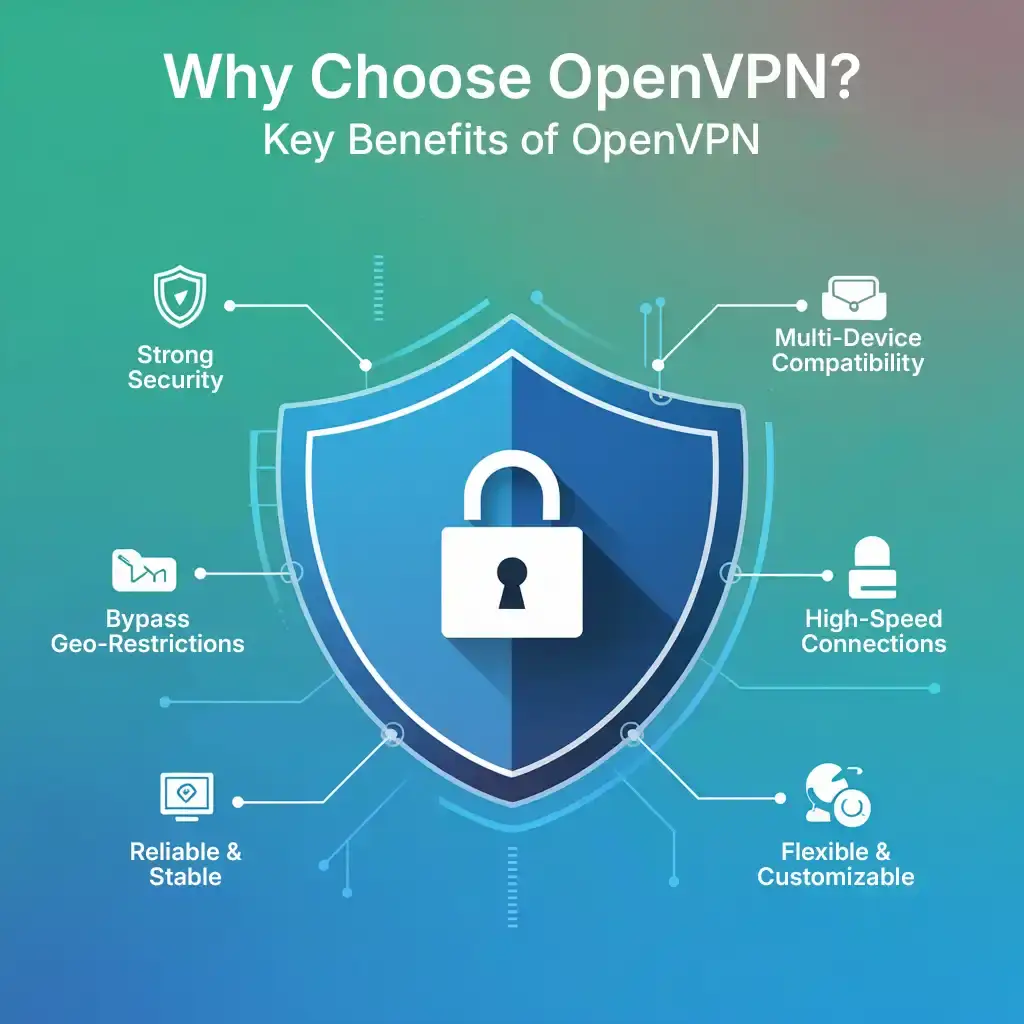
Let’s have a look at the key benefits of OpenVPN compatible VPNs.
Strong Security with Encryption Standards
The OpenVPN protocol is one of the most secure options available today. It uses military-grade encryption to keep your data safe. Your online activity is scrambled, making it unreadable to anyone trying to intercept it.
Hackers, governments, and even your internet provider can’t see what you’re doing online. This high level of security makes OpenVPN compatible VPNs trusted by privacy-conscious users worldwide.
Compatibility with Multiple Devices and Platforms
One of the great things about OpenVPN compatible VPNs is their versatility. You can use them on just about any device.
OpenVPN works seamlessly across all these platforms, whether you’re on an iPhone, Android, PC, or Mac. This makes it easy to stay secure, regardless of your device.
Ability to Bypass Geo-Restrictions
Want to access content that’s only available in another country? OpenVPN can help. It lets you change your location virtually, bypassing geo-restrictions and accessing websites or streaming services from anywhere.
It’s like having a secret pass to explore the entire internet, unlocking content generally blocked in your region.
High-Speed Internet Connections
One of the main concerns when using a VPN for OpenVPN is speed. Thankfully, OpenVPN is efficient and can provide fast, reliable connections. Whether streaming videos, gaming, or browsing, a VPN for OpenVPN ensures your speed is not compromised.
Many VPNs that support OpenVPN provide high-speed servers to enhance your online experience.
Reliable and Stable Connections
OpenVPN is known for its reliability. Unlike other VPN protocols, OpenVPN stays stable even when networks fluctuate. It adapts well to unstable networks and high-traffic conditions, ensuring you stay connected without interruptions.
VPN servers for OpenVPN are built to handle high loads, making it a dependable choice for casual and heavy internet users.
OpenVPN’s Flexibility for Different Use Cases
Whether you are trying to protect your privacy on a public Wi-Fi network or accessing geo-blocked content, OpenVPN adapts to your needs. Its flexibility makes it suitable for many use cases, from casual browsing to secure remote work.
It’s also customizable, meaning you can tweak the connection to suit specific requirements, like multi-device connections or higher levels of security.
What are the Drawbacks of OpenVPN?
OpenVPN is widely used for secure internet connections, but it’s not without its downsides.
Installation of OpenVPN Compatible VPNs Can be Tricky
Setting up OpenVPN isn’t always straightforward. It can confuse users, especially those who aren’t tech-savvy. The installation process involves multiple steps that require attention to detail.
Slower Speeds
Using OpenVPN may slow down your internet connection. Encryption takes time, leading to higher latency and slower speeds, affecting activities like streaming or gaming.
Not Compatible Everywhere
Some devices and systems don’t support OpenVPN. You might need third-party software, and some websites or apps may not work well when connected to OpenVPN.
Limited Vendor Support
OpenVPN doesn’t work smoothly with all network products, prominent ones like Cisco or Juniper. This could be an issue in large networks that use these systems.
Challenges with Large-Scale Use
OpenVPN may not perform well in larger setups. As more users join, the connection can slow down, and managing VPN for OpenVPN for a large group can get complicated.
Security Risks
While OpenVPN is secure, it’s not invulnerable. It can be affected by attacks, such as denial-of-service (DoS) attacks, which can disrupt the service.
OpenVPN has its pros, but it’s essential to consider these drawbacks before choosing it.
Troubleshooting Common Issues with OpenVPN Compatible VPNs
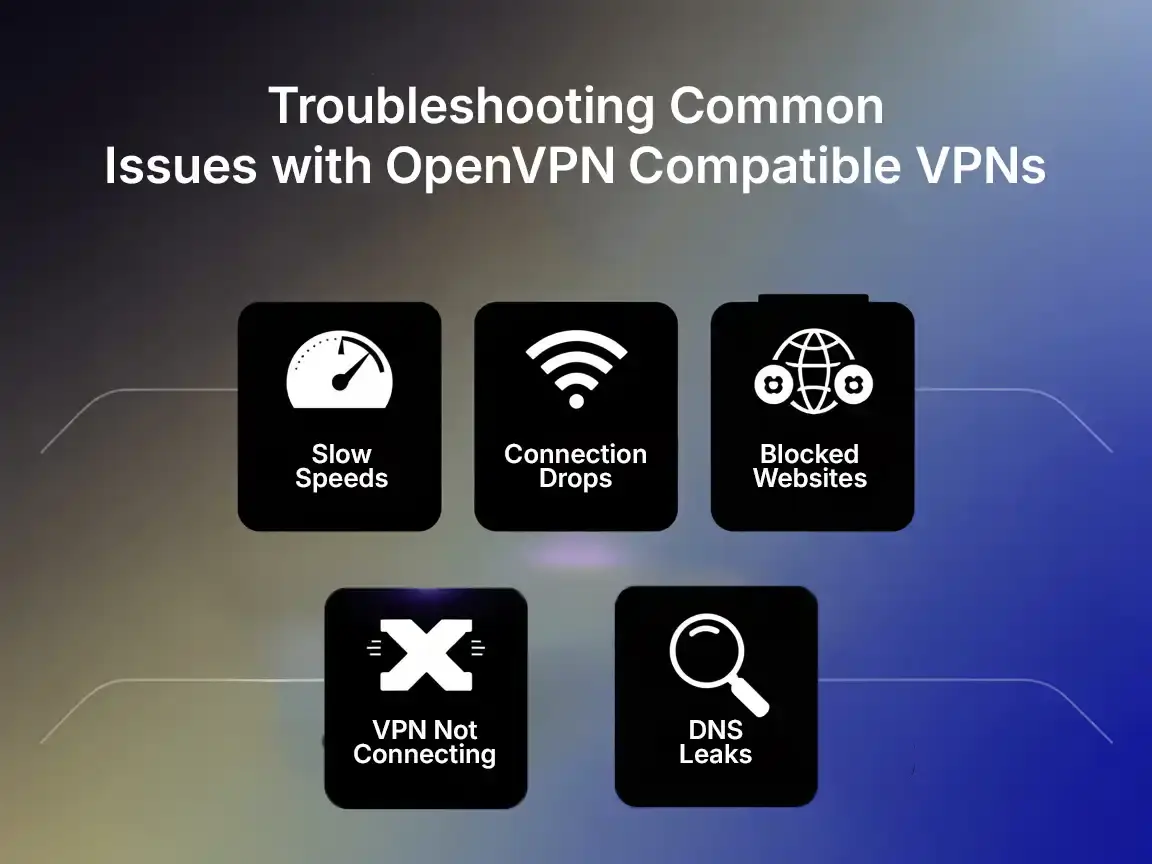
Even the best OpenVPN-compatible VPNs can sometimes run into problems. Fortunately, most issues are easy to fix. Here’s a guide to help you address the most common ones.
Slow Speeds
If you notice your connection is slower than usual, it could feel like you’re stuck in traffic. First, try connecting to a different server. Sometimes, a server is too crowded, slowing down your speed.
Switching to a less busy one can make a big difference. If that doesn’t help, consider changing the OpenVPN port. This can act like switching to a faster lane on a highway, allowing your connection to move more smoothly.
If the issue persists, check if your internet speed is slow even when you’re not using the VPN. If your internet connection is slow without the VPN, the problem might be on your end, not the VPN’s.
For more tips on picking the best server to avoid slowdowns, check out this short guide on VPN server location.
Connection Drops
It can be frustrating when your VPN connection keeps dropping. This is like when a phone call unexpectedly disconnects.
First, check if your internet is stable without the VPN. If your internet works fine, try turning your VPN off and on again. Sometimes, a simple reset can fix the issue. If the connection drops frequently, it might be time to update your VPN app.
Developers often release updates to fix bugs and improve performance, so updating your app could solve the problem.
Can’t Access Certain Websites
Sometimes, websites block connections from VPNs, which means you might not be able to access them. If you run into this problem, start by trying a different server.
The website may be blocking your connected server, so switching servers can help. If that doesn’t work, try changing the VPN protocol. VPN for OpenVPN supports multiple protocols, and some websites may allow one over another.
You might need to turn off your VPN to access that specific website if nothing works. While this isn’t ideal, it can help you bypass restrictions temporarily.
VPN Not Connecting
It’s frustrating when your VPN won’t connect at all. First, make sure you’re using the correct login credentials. A simple typo could be the issue. If your credentials are correct, check your VPN’s settings.
Sometimes, incorrect server settings can cause connection failures. Try reconnecting using the default server settings. If that doesn’t work, a firewall or security software on your device may block the VPN.
Temporarily disable any firewall to see if that resolves the issue.
DNS Leaks
A DNS leak occurs when your VPN doesn’t fully protect your browsing activity, potentially exposing your location or browsing history. To fix this, ensure that the “DNS leak protection” setting is enabled in your VPN’s options.
If the problem persists, you may switch to a VPN that offers more substantial privacy features. Another quick fix is manually setting your DNS to a trusted provider, like Google DNS or OpenDNS, and checking if this resolves the leak.
If none of these fixes solve your problem, don’t hesitate to contact your VPN’s customer support team. They can guide you through more advanced troubleshooting steps and help you resolve the issue quickly.

Get Started w/ NordVPN Today
- Top-rated VPN for OS unknown
- Ultra-fast speed in 2025
- Save 69% off with VPN.com Discount
- Plans starting at $2.99/month
- Rated 4.5/5 on Google Play with over 825,000 reviews
- Rated 4.7/5 on Apple App Store from 6,600 users
The Bottom Line
In today’s digital world, privacy is crucial. An OpenVPN-compatible VPN can protect your data by encrypting your connection and hiding your online activities. This makes browsing, streaming, or remote work safer.
OpenVPN is trusted for its strong encryption and flexibility across devices. It also helps bypass regional restrictions for streaming. In 2025, many VPNs, including NordVPN, CyberGhost, and ExpressVPN, will use VPN for OpenVPN for reliability.
While OpenVPN is secure, setup can be complex, and speeds may drop and not work on all devices. Despite these drawbacks, it remains a top choice for online privacy.
Customer Reviews for NordVPN Review 2025: Speed, Security & Real-World Tests
Connection issues with MLB.TV
May, 2 2023
Prompt customer service
May, 6 2023
I would highly recommend
December, 15 2023
Sorry we've not compiled any data on VPNs that offer What is OpenVPN Protocol? Best OpenVPN Compatible VPNs in 2025
